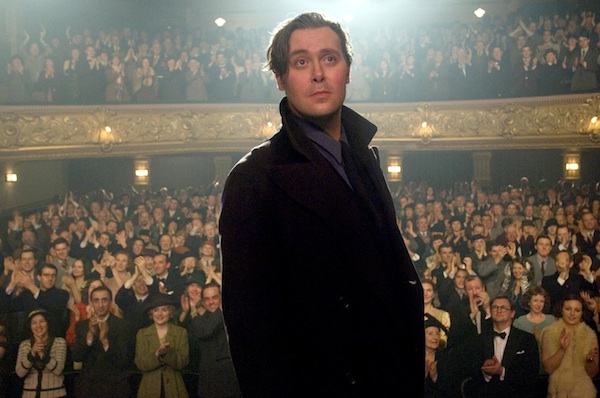By providing your information, you agree to our Terms of Use and our Privacy Policy. We use vendors that may also process your information to help provide our services. This site is protected by reCAPTCHA Enterprise and the Google Privacy Policy and Terms of Service apply.
‘Boyhood’ Director Richard Linklater Explains Why It’s Harder Than Ever to Make Movies Today (Part 2)
Eric Kohn

When “Boyhood” opens this week, Richard Linklater will reach the finish line of a remarkable production that took 12 years. In the first part of our interview with the director, he discussed the specific challenges of telling a story with no immediate precedent in film history. In this concluding segment, he speaks more generally about his iffy relationship to Hollywood and how the industry has changed since he broke out of the indie scene with “Slacker” more than two decades ago.
In Nathan Heller’s recent profile of you in The New Yorker, he says that by the late nineties you saw yourself as “a dropout of the Hollywood finishing school.” You only made “School of Rock” because producer Scott Rudin talked you into it. Why were you resistant to working with studios at that time?
It was clear I wasn’t going to be one of those chosen few of every generation who get to make their personal films at a studio level. Scorsese is one of them, and I’d say Quentin [Tarantino]. You know, it’s like, “The next film I do, sure, it cost a lot of money, but it made a lot of money, so I get to do my next film.” There are very few people who get to occupy that area, so it was clear I wasn’t going to be one of them. I wasn’t going to be that lucky to make personal films and fund them. “School of Rock” is a very personal film, but in an old studio system kind of way. It was this thing that already existed without me, but when I came in, I made it my own thing.
 But now that you’ve been able to make something like “Boyhood” without any studio involvement, could you even conceive of working with a studio again?
But now that you’ve been able to make something like “Boyhood” without any studio involvement, could you even conceive of working with a studio again?
I’m always looking for that. I’ve never really had bad creative experiences with studios. I’m always very cautious going in. You know, knock on wood, which I don’t believe in. It just depends on the story. I have some stories that are on the studio-ish level. It just depends. This one, “Boyhood,” I could make it for $200,000 a year. But I have other films that, dammit, they cost $14 million, or $10 million, or $20. So it’s always a negotiation with this industry.
It was recently reported that you were trying to adapt Daniel Asa Rose’s comic memoir “Larry’s Kidney,” with Will Ferrell and Zach Galifianakis.
That project’s not happening. The financing kind of went away.
Another instance of premature reporting?
Yeah, that’s the thing with those announcements. You never know. You never know the reason why it gets announced, but it’s usually someone on the financing or sales side trying to influence something. I don’t know why. The financing we thought we had disappeared. We might get it made sometime, but I have hopes for another thing.
In fact, you’ve got a lot in the pipeline, including reports of a Warner Bros. remake of “The Incredible Mr. Limpet”…
That thing has been in development for over three years. Interesting how the week I have a film coming out someone decides it’s a good idea to promote this. Not sure what they hope to gain.
And then there’s the so-called “spiritual sequel” to “Dazed and Confused” that takes place at a college.
There’s a lot of them. It’s frustrating. I have hopes for the college thing. That might be percolating…I had a promising meeting about it the other day. Actually, the truth is, it’s a “Boyhood” sequel for me. He goes off to college. It overlaps with the end of “Boyhood.” Has there ever been a movie that’s a sequel to one movie and a prequel to another?
Outside of “Star Wars”?
Well, yeah. Again, this is a spiritual sequel, not a direct one. Who knows? I always get excited when something gets off the ground.
And how does that inform your expectations in terms of distribution? You’ve had a lot of varied experiences with release strategies in recent years, from the self-distribution approach for “Me and Orson Welles” — which didn’t work out so well — to the more successful and very different tactics for “Bernie” and “Before Midnight.” Do you have an ideal approach for releasing films now?
 I’d like to have one. I have this thing that some filmmakers wouldn’t do, which is to make the film with an unknown plan. You’re kind of courting failure on the distribution end. You’re courting success, too, but you’re really subject to market fluctuations. “Orson” really fell through the cracks. The whole industry collapsed from the time we started to the time it was done. Things just changed dramatically and the movie got lost. It’s unfortunate, but you’re vulnerable to that. But that’s a deal I make. I’m just happy to get them made. You want people to see it, but it’s a little out of your control.
I’d like to have one. I have this thing that some filmmakers wouldn’t do, which is to make the film with an unknown plan. You’re kind of courting failure on the distribution end. You’re courting success, too, but you’re really subject to market fluctuations. “Orson” really fell through the cracks. The whole industry collapsed from the time we started to the time it was done. Things just changed dramatically and the movie got lost. It’s unfortunate, but you’re vulnerable to that. But that’s a deal I make. I’m just happy to get them made. You want people to see it, but it’s a little out of your control.
How much does box office mean to you? Reports on the latest July 4th box office were pretty dour.
It means something until it doesn’t. It’s good on two levels. One, you’ve connected with an audience — if it’s done well, people saw it. That’s preferable to the opposite. And then it just makes life a little easier. The times I’ve been out of the industry, I didn’t even notice. Everyone acts the same, but you just realize you’re not going to get that financing. They don’t send you that memo to tell you that you’re off that list, but you just realize it at some point.
What do you think about the video-on-demand market? Eventually, more people are likely to see a movie like “Boyhood” on VOD after its theatrical run, even if we won’t see the numbers.
 Maybe. It’d be nice from a filmmaker standpoint to get those numbers. For the longest time, you were judged strictly on your box office theatrical. So “Dazed” was seen as kind of “eh.” But when you look at the worldwide gross, Universal has taken home around $60 million. The film cost $6 million. That’s a success, right? But in its day, it was seen as not being a moneymaker, not being a success. I want credit for a success there, dammit. [laughs]
Maybe. It’d be nice from a filmmaker standpoint to get those numbers. For the longest time, you were judged strictly on your box office theatrical. So “Dazed” was seen as kind of “eh.” But when you look at the worldwide gross, Universal has taken home around $60 million. The film cost $6 million. That’s a success, right? But in its day, it was seen as not being a moneymaker, not being a success. I want credit for a success there, dammit. [laughs]
Earlier, we spoke about the challenges of following up a debut feature with another success. More generally, what do you think about the prospects for newcomers today?
What’s different now from when I started in the earlier nineties is that it’s harder for indie films to have that cultural impact. There are more films and they’re just as good — better, because there are so many — but it’s harder to crack it. The bigger commercial world is winning in every sector of our society. It just dominates the world — money, money, money. People are so conditioned to this. If you think back to other times in our culture, no one really cared. When I grew up, I didn’t know which movies were successful. You’d get a hint: “Oh, ‘Exorcist’ played for a year. I guess that’s a hit. Oh, then, ‘Jaws.'” Everyone’s kind of money-obsessed, but who cares what the price of a ticket is? It’s the same for every movie. It used to have to do with its cultural impact. In the sixties, nobody cared that Bob Dylan’s songs weren’t best-sellers, but they certainly did have an impact.
But it’s always been that way. Movies have always had to deal with the business. It’s always been hand in hand — in every country, too. If you study the careers of Bresson and Bergman, Tarkovsky — if you get into the minutiae of guys who you think are above it — they’re dealing with budgets, market expectations, all that bullshit. So this is just inherent in this particular art form. You can’t really get too attached to it.
To use the example of some local Austin filmmakers you know, the Zellner brothers’ “Kumiko, the Treasure Hunter” premiered at Sundance in January, was well-received, and even featured a star with Rinko Kikuchi as the lead. Yet it just landed distribution with Amplify a few weeks ago.
 The thing that’s changed the most is that it’s money-based. An industry figure looks at a movie like “Kumiko,” and they used to be like, “Hey, that’s a great fucking movie, I want to show that to the world.” When “Slacker” came out, they spent about $200,000 marketing that movie.
The thing that’s changed the most is that it’s money-based. An industry figure looks at a movie like “Kumiko,” and they used to be like, “Hey, that’s a great fucking movie, I want to show that to the world.” When “Slacker” came out, they spent about $200,000 marketing that movie.
In other words, one summer budget for “Boyhood.”
Yeah. Exactly. And it made $1.3 million. That was a success. Now it’s like, “Oh, we can’t even reach an audience for less than millions to even let the world know something exists.” It’s gotten so expensive on that side of it, so the indie distributors — the bigger ones — have to wonder if they can make $20 million or $50 million. That’s not a lot of companies, but the ones that have those breakthroughs. So the bar is so high. What a film has to do to even be worth someone’s while…it’s just tough.
By providing your information, you agree to our Terms of Use and our Privacy Policy. We use vendors that may also process your information to help provide our services. This site is protected by reCAPTCHA Enterprise and the Google Privacy Policy and Terms of Service apply.
















